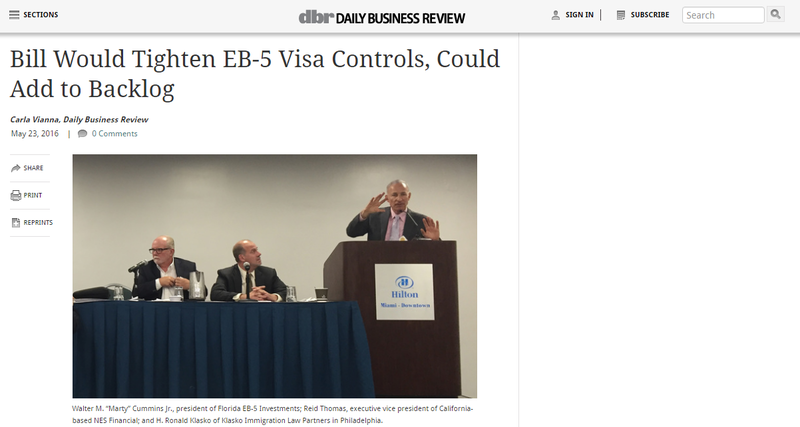The EB-5 cash-for-visa program may be facing drastic changes, which supporters fear could turn away would-be investors and further delay a backlog of Chinese applications.
A five-member panel addressed the program's legislative hurdles Friday during an EB-5 seminar hosted by Arnstein & Lehr in Miami.
Foreigners can earn a green card by investing $500,000 to $1 million in a job-creating U.S. development, most of which is done through EB-5 regional centers.
A bill introduced in the U.S. House would tighten regional center reporting requirements, job-creation standards and use of foreign capital.
The EB-5 Integrity Act of 2016 also would require regional centers to consult the Department of Homeland Security before making administrative changes and retains the department's right to revoke approval for developments at risk for fraud.
Reid Thomas, executive vice president of California-based NES Financial, said the EB-5 industry should independently embrace transparency.
"We sure as heck know what the vast majority of these kinds of integrity measures are," he said. "As an industry we should be mature enough … to just implement these things. It's not rocket science."
Regional centers, which are designated by U.S. Citizenship and Immigration Services to sponsor EB-5 capital investment projects, should anticipate reform and adapt policies for a healthier program, said Miami attorney Walter "Marty" Cummins Jr., president of Florida EB-5 Investments LLC.
Last year's failed attempt at reforming the EB-5 law won it an extension to Sept. 30. Since it's a presidential election year, immigration attorney H. Ronald Klasko initially expected a similar story line this year. But in light of the fraud alleged by the Securities and Exchange Commission in the Jay Peak EB-5 development in Vermont, he's not so sure.
"There's real pressure now to do something at least on the integrity side of things to deal with the Jay Peak problem," said Klasko, a founding partner at Klasko Immigration Law Partners in Philadelphia.
He said another issue topping the industry's list of priorities is the growing backlog of applications from China. The U.S. caps the number of EB-5 visas at 10,000 a year, yet the program received over 17,000 applications last year, according to the Citizenship and Immigration Services.
There were nearly 22,000 investor applications pending at year-end, which extended the waiting period to at least five years for most investors.
Klasko pointed out immigration is not the "best issue to get elected on." At its core, the EB-5 phenomenon is "an immigration problem," he said.
Chinese investors, who have secured 80 percent of the EB-5 visas, are facing up to eight-year processing periods based on the current backlog.
A panel of EB-5 experts discusses the legislative hurdles faced by the cash-for-visa program amid heightened federal scrutiny.
Mentions
- Saul Ewing Arnstein & Lehr LLP
- NES Financial
- U.S. Citizenship and Immigration Services
- UNITED STATES SECURITIES AND EXCHANGE COMMISSION
- Klasko Immigration Law Partners, LLP
- Florida EB5 Investments Regional Center
- Reid Thomas
- Walter M. Cummins Jr.
- H. Ronald Klasko
States
- California
Securities Disclaimer
This website is for informational purposes only and does not constitute an offer or solicitation to sell shares or securities. Any such offer or solicitation will be made only by means of an investment's confidential Offering Memorandum and in accordance with the terms of all applicable securities and other laws. This website does not constitute or form part of, and should not be construed as, any offer for sale or subscription of, or any invitation to offer to buy or subscribe for, any securities, nor should it or any part of it form the basis of, or be relied on in any connection with, any contract or commitment whatsoever. EB5Projects.com LLC and its affiliates expressly disclaim any and all responsibility for any direct or consequential loss or damage of any kind whatsoever arising directly or indirectly from: (i) reliance on any information contained in the website, (ii) any error, omission or inaccuracy in any such information or (iii) any action resulting therefrom.




